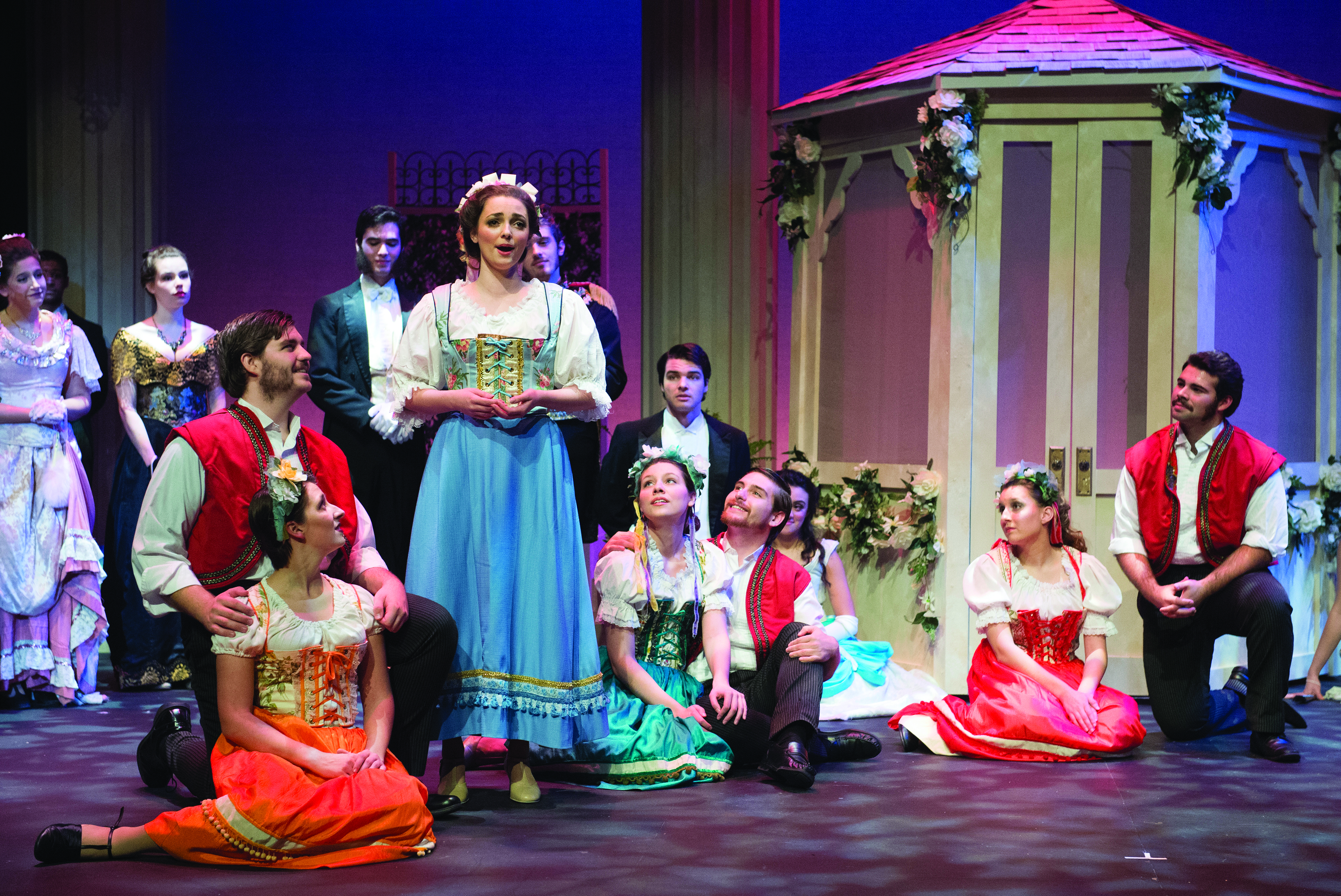
KRIS HARRIS
Staff Writer
Wild merriment and tender love filled the Rockefeller Arts Center’s Marvel Theatre, as the Hillman Opera played last weekend with its hilariously updated version of Franz Lehar’s “The Merry Widow.”
The production was truly a feast for the eyes and ears, from extravagant costumes, entrancing dance numbers, spot-on lighting design and a beautiful set, to professional-caliber opera singing framed by an uplifting orchestral score.
The costumes were truly convincing, transporting the audience to 19th-century Paris. The ladies were decked out in colorful, multi-layered petticoats and dresses, complete with ruffles, lace and fans to match. The men wore elegant suits with tails, and Count Danilo Danilovitch, played spectacularly by Michael Hawk, donned a military dress uniform, complete with a sash, cape and golden-fringed epaulettes.
Hanna Glawari, the “Merry Widow” herself, played by Lucille Horn, wore a series of stunning costumes, including an elegant gold and black dress with a train, which sparkled and fit her perfectly. It is needless to say that Horn looked — and sounded — flawless throughout the entirety of the production.
The only slight pitfall of the costumes were the long trains and petticoats, which proved an obstacle for the actors during the dance numbers. Thankfully, no one fell on stage, though it seemed as if there were a few moments which almost “tripped up” the actors, so to speak. There were also a few awkward moments where the men in the cast kept stepping on Glawari’s train.
The operetta contained many dancing scenes, ranging from elegant to outright entertaining. One particularly memorable scene comes to mind, which featured the men of the cast, dancing and singing in a feminine manner, to make a mockery of their women, whom they had become increasingly frustrated with. The song became more ridiculous as it went on, even featuring a kickline, and ending with the actors in various compromising positions. This number elicited an uproar of applause and laughter at the fin.
Another audience favorite was the risque Cabaret dance at the end of the production, featuring “The Grisettes.” The piece began with the curtain halfway up, revealing only a dozen pairs of legs in heels and fishnets. The number was both sexy and comedic, without becoming tacky or overly-sexualized, and featured many impressive dance moves, including lifts, dips and even a few front handsprings.
The set for “The Merry Widow” was grandiose, as large Grecian pillars and a chandelier towered over the actors but did not take away from their performance. During the second act, flora was set atop of the pillars, along with an immaculate white gazebo placed at the center of the stage, which portrayed a beautiful garden scene, set in Glawari’s home in the fictitious country of Pontevedro.
However, the true gem of the operetta was the music. Whether it was comedic or romantic in nature, every vocal performance was handled with much expertise. There were very few problems when it came to projection and pronunciation, as the actors were clear and concise with their solo performances, even executing the French parts with finesse. Within the chorale, the harmonies were well blended and filled the theater with conviction.
There were many brilliant vocal moments throughout the show, one of them being between Danilo and Hanna as the Count refuses to accept his love for the the widow.
Another superb moment was between Camille De Rosillon, which was executed amazingly that night by Monzer Aboulnaga, as he tries to swoon Valencienne, played by Oleksandra Verzole, who is already within a committed relationship, claiming herself to be a “honorable wife.” Duets between the pair were gorgeously blended, and made their romance all the more believable. Aboulnaga also hit a few spectacular tenor notes throughout the operetta.
In addition, the orchestra, led by Dr. David Rudge, was phenomenal. There were no audible missteps taken instrumentally, as the orchestra played the score beautifully, from its supporting moments to its jubilant and profound waltzes.
A folk ensemble, which was a great inclusion, was that there was included onstage during a dance scene within the garden, including string instruments such as the mandolin and balalaika.
Overall, minus a few mishaps, such as a few moments of speaker interference, the operetta was carried out splendidly and created a night of of great comedic and soft-hearted moments.
* Rebecca Hale, Reverb Editor, contributed to this article
